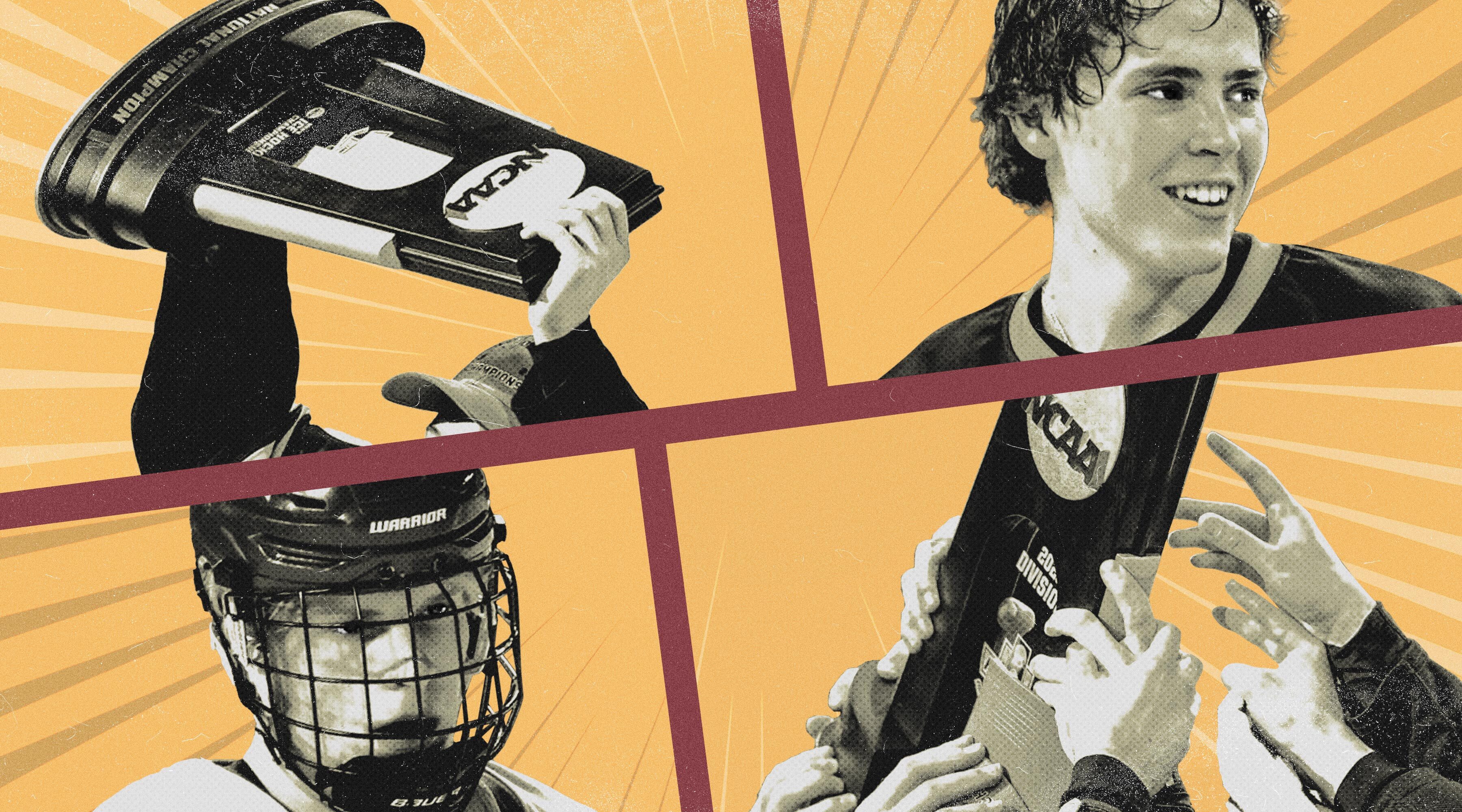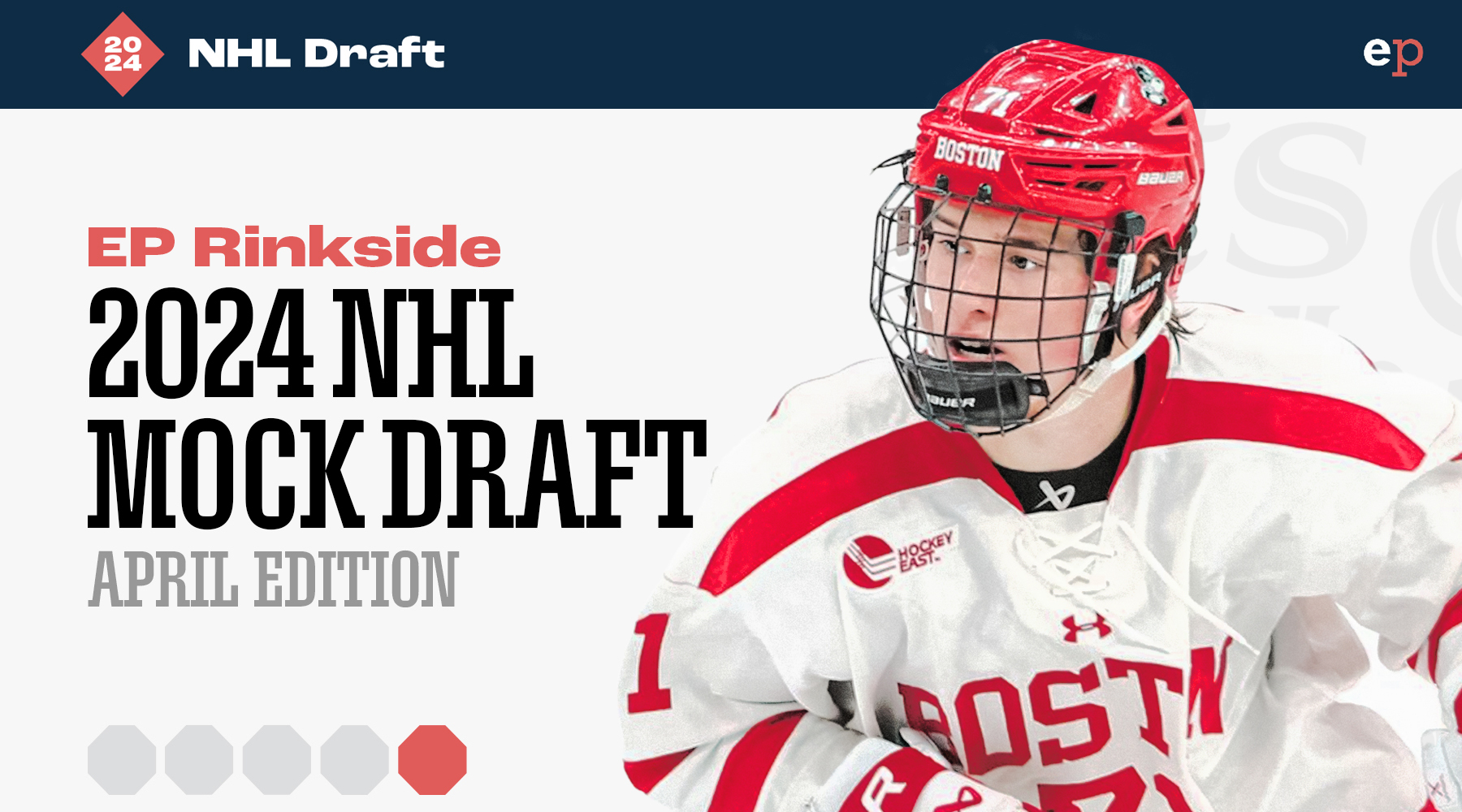Frozen Four championship preview: BC and Denver meet for a chance at immortality

This is what it's all about.
Boston College, the No. 1 team in the country for the vast majority of the season, will take on the University of Denver, consistently one of the top-three teams in the country for the vast majority of the season, for the national championship.
In terms of goals per game, Denver is first in the country (4.65), and BC is second (4.58). The teams they beat to get here, holding them to a single goal, combined, were Nos. 3 and 4, respectively (Michigan had 4.12, and BU 4.08).
Just looking at the numbers, the reputation they've built over the course of the year, and the recent form, you'd have to say BC is the slight favourite, but it's one game, and the margins between these teams are incredibly tight just about everywhere you look.
If Denver pulls off what would be an on-paper upset in its 12th national-title game appearance, it will win its second championship in three years and third since 2017. More importantly, the title would be the Pioneers' 10th overall, pushing them ahead of Michigan for sole possession of the all-time lead. They have not lost a national championship game they've appeared in since 1964.
If the Eagles win, it will be their first championship since 2012, and sixth overall, moving them into a tie with Wisconsin for fourth all-time, behind only Denver, Michigan, and North Dakota.
Despite the fact that BC has been to the Frozen Four 26 times since 1948 (second-most in the country), and Denver has 18 such trips (sixth) this is the teams' first-ever meeting in the national championship game, and only the fourth time they've even been in the same Frozen Four together.
This year, these have been two of the three best teams in the country basically since puck drop back in October, and Denver just knocked off the No. 2 team, BC's archrival, Boston University. Sure, that denied us the cross-town rivalry grudge match, but BC's win over Michigan denied us the national championship game to determine which team would have the most national championships in NCAA history. So, storylines shattered all around.
We can take consolation in the fact that this matchup is about as good as it gets, in terms of quality of team, from the top of the roster to the bottom.
Let’s get into the matchups:
No. 1 Boston College Eagles (34-5-1) vs. No. 3 University of Denver Pioneers (31-9-3)
The storyline
In late October, the University of Denver Pioneers came out East and visited Conte Forum, home of the Boston College Eagles, on a Saturday evening.
BC was up 2-1 going into the third period, but something slipped. They took a penalty less than two minutes in, then conceded a goal to Denver's fourth line at 4:33. Another penalty midway through the period led to another goal, and while Will Smith tied the game with a power-play goal of his own a few minutes later, the Eagles ended the night by putting Denver on two more power plays, back to back. They killed the first one, but not the second, and the Eagles lost at home.
It was one of only two losses these Eagles, who set a school record for wins on Thursday night in the national semifinal, suffered after holding a lead in the third period, and one of just two losses when they had last change all season.
"That was a long time ago," said BC coach Greg Brown after his team knocked off Michigan, 4-0, on Thursday night. "We've improved a lot."
Tonight, the stakes are quite a bit higher than an October out-of-conference clash. The Eagles and Pioneers meet for the national title, and a lot has changed since then.
"They play a fast transition game," said BC defenceman Eamon Powell. "They're a skilled team, just like us I feel like. It should be a great test to see how far we've come as a team from the start of the year. They have a lot of skill, they can make you pay in the power-play. We're really looking forward to it."
While these are the two most productive teams in the country in terms of total goals, it must also be said that they are incredibly stingy. The Eagles allowed the fourth-fewest goals per game this season (2.2), and while Denver's season-long number is middling (2.8), they've really put the clamps down in the past two months, conceding just 40 in the last 17 games (2.36 per). Since the playoffs started, that number is 10 goals against in seven games, three of which went beyond regulation.
Denver coach David Carle talked at length on Friday about how the Pioneers' fortunes have changed considerably in the second half of the season. At the end of the first half, the coaching staff showed the team that they were in the bottom third or so of the country in terms of goals against per game, and the vast majority of recent national champions tended to be in the top five.
"I don't know what the exact numbers are, where we're at today, but it's certainly been excellent once we've hit the national tournament here and our level of desperation and urgency to defend and defend properly has been there," Carle said. "There's no doubt that's been a huge part of our success. I don't think we had a win all year with scoring two or less goals. To have three straight games of two or less goals and to be 3-0 in them in the tournament, I think, goes to show the commitment that the players have, getting that leadership group, they've done a good job."
It's not just that Denver has given up just three goals in their three NCAA tournament games, but also that two of those games went to OT, to the extent that it's closer to four games' worth of TOI (223:37). And they've only given up 106 shots on goal in that much game time.
Both coaches termed that meeting back in October as "exciting," and said that they told each other they hoped to see each other down the road. While BC has certainly grown into its full potential for a style of game it cultivated from Day 1, Denver's change into a defensive juggernaut is more notable, and poses a unique challenge.
"They're hard to open up," Brown said. "They really play well as a team defensively. They seem like, watching [Thursday night], they're moving as a group of five all over the ice. There's not a lot of free space, they're not spread out. They do a great job of getting numbers around the puck. We know we're going to have to play with a lot of pace and change sides and try and open up some free ice."
The potential matchups
Boston College
The Eagles' lineup is an open book at this point of the season. When Gabe Perreault came back from an undisclosed upper-body injury in the Hockey East semifinals, it re-solidified a group of lines that had been running as solid units for a good chunk of the season (not that Cutter Gauthier didn't go crazy in his absence, averaging three points per game). There's basically not going to be a change in the lines from Thursday night, because there wasn't one in the four games before that, either.
The following stats, though, do not include Thursday's game, in which the Eagles were out-attempted 73-41 and outshot 32-22, but rolled to a 4-0 win in which the game was tied for all of 80 seconds before Will Smith scored the Eagles' first goal.
Throughout the last few months, as the Eagles ripped off 15 straight wins since early February, their lines have remained remarkably consistent, and based on Friday's practices, there's little reason to suspect they'll change things tonight.
These are the lines BC has been running for quite a while:

After Thursday's win, you can be sure that these lines took a bit of a hit in terms of CF% and SF%, but their goals numbers only improved (even if two of the four Eagles goals were scored at 4-on-4).
BC has outscored opponents 25-9 in all situations when all three of Oskar Jellvik, Gauthier, and Andre Gasseau have been on the ice at the same time this season. They are more of the shutdown guys, because the freewheeling, ultra-dangerous offence comes from freshmen Perreault, Smith, and Ryan Leonard. When that trio is together – often including Gauthier because they make up four of the five guys on the top power play unit – the Eagles have a 67-12 scoring advantage.
The freshmen on that high-scoring line all have at least 60 points for the season (Leonard and Perreault got there on Thursday night), making them three of just nine players since 2002-03 to post that many points in their rookie seasons.
"The way they read each other offensively, they also have that same feel defensively," Brown said of his freshman trio. "It may not look like textbook defensively, but they understand what each other is doing and cover for each other in maybe not a traditional way, but they do a great job without the puck, as well."
As you can see, the bottom two lines mostly just succeed in wrestling opponents to a draw, which is all they need to do when the top two lines outscore opponents by such wide margins.
On defence, everyone's pretty steady and, because of how Brown distributes ice time, they get plenty of time with both the depth guys and the superstar lines. However, the Jacob Bengtsson-Lukas Gustafsson pair are mostly the matchup guys, and you can see how much they and the forwards they play behind don't let opponents get much going offensively.
So while the Eagles probably weren't super-happy with their defensive performance on Thursday, there's also little reason to change much. Michigan didn't exactly get to the net with a ton of consistency throughout the game, despite being one of the most dangerous offences in the country. Again, it was a case where they had the puck a lot, but were mostly kept to the outside. The shot volume the Eagles gave up wasn't great, by any means, but the average quality never really put much of a fright into them.
Denver
On the other lineup sheet, however, a lot more is up in the air than BC's.
And that's a good thing, because it means star forward Massimo Rizzo returned to the lineup on Thursday after missing 14 games with a lower-body injury.
He started on the fourth line, but ended up moving around the lineup a little bit, before ending up playing most of the second half of the game next to Tristan Broz, who took Rizzo's role as No. 1 centre and scored the overtime game-winner on Thursday, and Jack Devine, with whom he formed a powerful partnership before an injury that would have been devastating to a lesser team.
Broz and Devine weren't quite as productive together as the Rizzo-Devine collaboration, but the Pioneers went 12-1-1 without one of the best players in the country in the lineup, which speaks to how well Broz filled in, and the overall depth of the team.
Denver didn't practice on Friday, perhaps to keep their cards close to the vest, and perhaps because they just played a 75-minute overtime game the night before.
Because they didn't really have consistent lines throughout the semifinal, and didn't have Rizzo in the lineup for a huge chunk of the season leading up to the Frozen Four, it's hard to project what the lines will look like tonight, but here's a best guess (these stats also don't include Thursday's 2-1 overtime win against BU):
.png)
The good news here – at least in the context of how it affects me, the guy who had to make the spreadsheets – is that college hockey teams are allowed to dress an extra skater, and Denver used Tristan Lemyre as the 13th forward even as Rizzo slotted into the lineup on the fourth line. So my guess here, which is by no means what's going to happen tonight, is that Rizzo moves up to the top line, where he finished the last game, and Lemyre moves into that fourth spot. Meaning the bottom three lines don't change. Why would they? Every line has outscored the competition by a good margin when they've been grouped together. But of course, who knows? Lemyre isn't going to drop off the roster after he scored Denver's opening goal on Thursday.
Otherwise, these lines have been pretty consistent. It's Rizzo's presence that might muddle things; if they move him back to the centre position, everything above will be different. Which might just be a benefit for Denver.
On the blue line, there's a lot more consistency, as those top two defensive groups have stayed remarkably consistent throughout the year. Perhaps the key here is Zeev Buium, the nation's second-youngest player who has been getting first-pair minutes since he arrived on campus in October.
"[He] has an ability to, like, play the game that's in front of him, which I think is really impressive," Carle said. "I mean, he can be a part of opening a game up, but he also can be a part of shutting plays down and play in the 2-1 games. He doesn't look uncomfortable in our NCAA tournament games, he didn't look uncomfortable at the [World] Juniors, not being on the power play. To me, it's hard to find a more impactful player. Shift in, shift out, game in, game out, that's available in the draft."
So despite the fact that BC has the majority of the brand-name prospects in this game, Denver's weapons are arguably just as scary, even if they haven't been racking up the goals lately. Carle called the fact that they've been held to two goals in three straight games an aberration, but that might end up being the difference here.
On Thursday night, Denver proved it can manufacture enough offence against the No. 2 team in the country to eventually break through, whereas Boston College got badly out-possessed by the No. 10 team and still converted on about half its chances to cruise to a four-goal, shutout win.
The goalie duel
On paper, this is where the game looks like it's really BC's to lose.
But looks can be deceiving.
The season-long stats on Matt Davis tell the story of a goalie who missed almost a third of the season due to injury, whose team struggled defensively in front of him for the whole of the first half. Apart from one or two lapses down the stretch, the Pioneers have made themselves one of the most dominant 200-foot clubs in the country, and Davis is reaping the benefits.
At the other end, Jacob Fowler has been one of the best goaltenders in the country from Day 1 of the season. Some of that is how steady his team has been in front of him, but a lot of it, too, is just the fact that he's extremely good, especially for a freshman.
So what does that mean for the matchup? Here are their overall stats for the season, including some data from InStat:
.png)
The thing is, though, if you were to separate out Davis's second-half stats – and certainly his stats since the playoffs started – his numbers start to look a lot more like Fowler's.
Not that you necessarily want to get into saying stuff like, "if you make the sample size smaller…", but since the NCHC regular season ended, Davis has only allowed nine goals in almost 400 minutes of hockey (1.35 GA/60), facing 195 shots (a .953 sv% on 29.4 SA/60). He also faced just 61 high-danger chances (9.2 HDCA/60), conceding seven goals (.885 HDsv%). You really can't ask a goalie to do better than that, and all those numbers would assuredly make him look even better if tracked data from Thursday's win over BU were available.
So what's made such a big difference for Davis, beyond the broader team commitment to playing more responsible hockey?
"His confidence and poise in reading plays," Carle said. "I think he's more patient, on his feet, more pucks are sticking to him. Just the ability to track pucks into his body. That's what I see on the bench, just a calmness to him."
Again, many teams have learned to their dismay over the course of the season that even if you can do a lot to thwart the BC offence, they're still gonna score on like 40 percent of their high-danger chances. So, y'know, Denver could very much be the team that makes sure that doesn't happen, and Davis's life could be pretty easy even at this stage of the season against this team.
But how likely is that, if we're being honest?
The big picture
With all of the above having been said, it's impossible to predict how this game is going to be played. Denver entered that 2-1 OT win over BU on Thursday expecting it to look a lot like a 4-3 game, and they didn't get it. Didn't matter. Especially with Rizzo back in the mix and getting his feet back under him after a slow start on Thursday, the potential for some more fireworks is certainly there. But if it's low-scoring, no one is going to feel out of place.
"We've said we can win any type of game," Smith said. "We take pride in that. If we play a 1-0 game or high-scoring game, we'll be there. We knew coming into this tournament was going to be a battle. We didn't know what we were going to get from each team. We have one more to go. Denver is a very high offensive team. We're ready for anything."
For the Pioneers, hunting for that mythic 10th national title, the view is much the same.
"We'll be very focused on Boston College," Carle said. "They have our full attention. They've had it for a while. We obviously played them earlier, we've seen what they done. They've really gone wire to wire as the No. 1 team in the country. From December on, they haven't really looked back or taken their foot off the gas. Very impressive what they've done. There's no doubt that as much as we want to talk about 10, we have to go out and execute at a very high level against a team — not just a bunch of individuals, a team — that plays great together and has really been a dominant force since December on."
From top to bottom, these are the most impressive rosters in the country, so it's fitting that they're meeting again. October? That was a hell of a long time ago.
How to watch
If all that sounds good to you, here's the TV details for where and when you can watch it tonight (all times Eastern):
Saturday
National championship game, 6 p.m. – ESPN2 and ESPN+ in the U.S.; TSN+ in Canada



